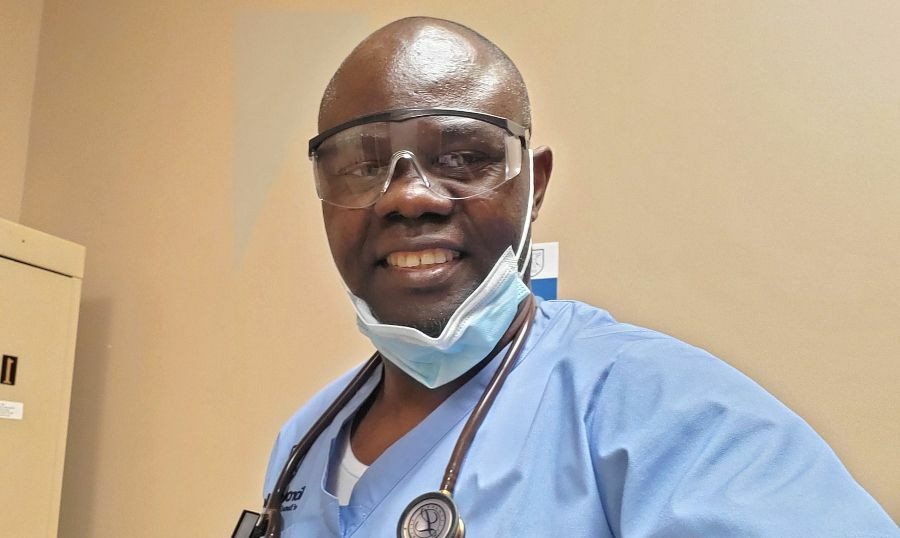Dr. Polepole faced many challenges, including a language barrier and a limited understanding of how to navigate the healthcare system. “I remember my wife going to the hospital by herself and not having a good experience due to all the cultural and language barriers,” recounts Dr. Polepole. “The staff at the hospital had difficulties communicating with her.” It didn’t take him long to realize that thousands of other newcomers might be in a similar position, which led to his founding of The Immigrants Healthcare Support Network (IHSN).
IHSN is a network of health professionals from around the world committed to promoting equitable access to quality healthcare services for vulnerable members of the community, with an emphasis on refugees, and recent immigrants. The idea of establishing IHSN was inspired by his first interaction with the Canadian healthcare system as a receiver of care and began with community consultations to test how many people faced similar challenges. The consultations confirmed that many new immigrants and refugees, including those with healthcare backgrounds, faced difficulties finding healthcare services in their new country.” Since then, Dr. Polepole has been contributing to healthcare in various capacities while serving underrepresented groups. “We live in an inclusive country that welcomes thousands of refugees, but who face hardship in gaining access to quality healthcare information and services,” Dr. Polepole explains. In a conversation with Dr. Polepole and Dr. Mithila Orin, full-time staff at IHSN, we discussed the organization's mission, programs, and goals, as well as how they've managed to navigate through the challenges presented by COVID-19.
Lived Experience
Although Dr. Polepole draws inspiration from helping others get access to quality healthcare services, he acknowledges that most healthcare professionals are busy with clinical work and don’t have the time to go to newcomer communities to raise health awareness and prevention; this is where teams like IHSN can fill the gap. “Internationally trained healthcare professionals might be doing different jobs to make ends meet, but they can raise awareness with their knowledge and experience before they even become licensed to practice in clinical settings,” says Dr. Polepole.
All that said, Dr. Polepole never anticipated how difficult it would be to pursue his own medical career in Canada. “As a refugee, I found this a welcoming country that provided me with a safe environment to live in, but I didn’t know it would be this difficult to advance my professional career,” Dr. Polepole admits. “To get a license as a medical doctor you’re required to undergo a very competitive process that includes taking several expensive exams, expanding your professional network, and finding experts to mentor you through the integration process and provide recommendations.”
Dr. Polepole still believes that Canada offers a lot for newcomers. “Although it’s not easy to find professional opportunities, you can find something fulfilling and create a significant impact using your knowledge and experience,” he says, pointing to personal experience as an example. “While I haven’t been able to practice clinical medicine, I’m still able to use my medical education and experience to contribute to promoting health in the community.”
Vision & Programming
IHSN is a Black-led and volunteer-based organization promoting inclusiveness and diversity that currently has 4 staff and 15 volunteers serving in various capacities. The vision behind IHSN is to mobilize a community of internationally trained healthcare professionals for volunteer work while waiting to obtain their professional licenses in Canada. Their main task is to run awareness campaigns to inform the community of healthcare services, healthy lifestyles, and disease prevention. IHSN operates from within the Greater Toronto Area (GTA) but has greatly expanded its reach beyond the GTA due to its online presence. It partners with the Federal Government, the Canadian Red Cross, refugee reception centers and other community-based organizations, and accepts funds from individual donors who wish to offer their financial support.
Some of the main programs IHSN offers include:
(1) Mental Health Education and Support Program:
IHSN raises awareness about mental health issues and provides information related to the pandemic.
(2) Healthcare Support and Outreach Program:
Spreading general awareness on various health topics including, but not limited to, nutrition, cardiovascular disease prevention, and risks associated with recreational substances.
(3) The COVID-19 Prevention and Support Program:
Raising awareness about COVID-19, including where to find healthcare providers during the pandemic, provision of personal protective equipment, as well as providing nutritional and financial support.
(4) Smart Start Program for Internationally Trained Professionals:
Using the cumulative knowledge and experience of internationally trained professionals to improve awareness about healthcare in the community and provide them with Canadian working experience and networking opportunities.
Dr. Mithila Orin is a former volunteer and current Mental Health Counselor of IHSN. She is an internationally trained medical doctor and a researcher with over five years of work experience and a Master’s Degree in Public Health specializing in Epidemiology. It didn’t take long for her to secure a staff position at IHSN. “As an internationally trained medical doctor, I wanted to do something for my community during the pandemic, so I volunteered with the IHSN and visited multiple shelter houses to facilitate mental health workshops,” Dr. Orin says, expressing gratitude for the opportunity to work with IHSN. “I feel truly blessed to help immigrants and communities in Canada.” Like Dr. Polepole, Dr. Orin believes that there are many different pathways for healthcare professionals to take and encourages internationally trained health professionals to use their skills and abilities in a different capacity.
One way IHSN staff are using their knowledge is to tackle issues around vaccine equity and disinformation. “We’re trying to combat vaccine disinformation campaigns by ensuring the public understands the messaging of public health officials mandated by the government,” Dr. Polepole says. Many of these individuals have a language barrier and aren’t very computer literate, so IHSN tries to bridge the gap by translating messages from government and health officials. “We translated most of the information into several languages spoken by refugees and newcomers,” Dr. Polepole explains.
The Impact of COVID-19
As with traditional viruses, newcomer communities are also highly vulnerable to COVID-19. “The conditions under which they live can promote cross-contamination, so they should be among the first in line to receive vaccinations,” says Dr. Polepole. Specifically, on the subject of COVID-19 transmission, Dr. Polepole still stresses the importance of following the basic prevention recommendations of public health authorities. “The vaccine is here, but we must do what we can to keep protecting ourselves and others until everyone gets it, and until we know exactly how much it can protect us,” says Dr. Polepole. “Stay home whenever possible, wear a mask when it’s required, wash your hands, and keep a safe social distance.”
Dr. Orin points out that the pandemic has made communication more difficult. “We’re no longer getting the opportunity to make in-person visits, but we’re trying to cope with this situation by using technology and social media to reach members of the community,” Dr. Orin explains. Most people served by the IHSN don’t have access to a cellphone or a computer, so the IHSN is also working with partner organizations to make basic equipment available to their residents so they can access services virtually. As for the challenges created by the pandemic for the broader community, Dr. Orin’s message focuses on collective responsibility. “We’re all in this together.”
Like other organizations, the IHSN has also seen its resources affected by COVID-19. The organization’s services have seen an uptick in demand but funding from individual donors has decreased. They also don’t have access to as many active volunteers as they had before. “Some of our volunteers move on to different projects or get hired in long-term health care settings, which is good to hear, but it then falls on us to recruit and train new volunteers,” Dr. Polepole laments. “Coping with all of that can make things difficult for us.” However, Dr. Polepole remains hopeful and committed to offering services to the community in the face of adversity. “This organization is built on the work of volunteers who are committed to serving their communities,” asserts Dr. Polepole. Going forward, the IHSN hopes to service a larger population by increasing the number of partners and volunteers, have access to more resources, and launch an information campaign to inform more people about their activities. The IHSN is also currently working on restructuring and reorganizing itself to continuously deliver better services.
Acknowledgments
The IHSN began operating in December 2018, which Dr. Polepole attests is due to the efforts of his colleagues, Hani Bashir, MD and Ms. Charlotte Tambwe. The IHSN is also grateful to all its staff, volunteers, partners, and funders, which includes the Government of Canada and the Canadian Red Cross.

 By
By 





